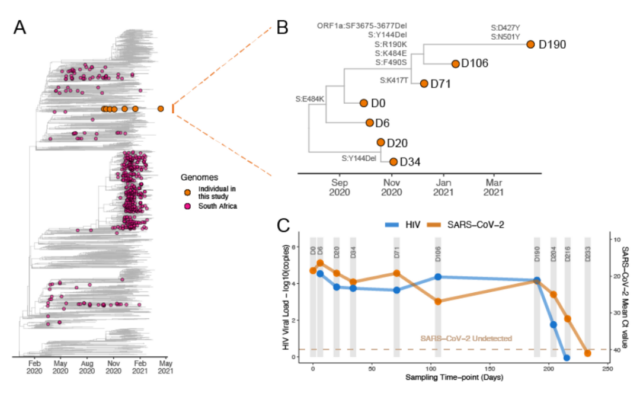The new coronavirus in the body of AIDS patients could mutate rapidly
- Normal Liver Cells Found to Promote Cancer Metastasis to the Liver
- Nearly 80% Complete Remission: Breakthrough in ADC Anti-Tumor Treatment
- Vaccination Against Common Diseases May Prevent Dementia!
- New Alzheimer’s Disease (AD) Diagnosis and Staging Criteria
- Breakthrough in Alzheimer’s Disease: New Nasal Spray Halts Cognitive Decline by Targeting Toxic Protein
- Can the Tap Water at the Paris Olympics be Drunk Directly?
The new coronavirus in the body of AIDS patients could mutate rapidly
The new coronavirus in the body of AIDS patients could mutate rapidly. The rapid mutation of the new coronavirus in the body of AIDS patients has caused the new coronavirus to evolve and become more powerful.
The COVID-19 pneumonia epidemic caused by the COVID-19 virus has now infected more than 180 million people worldwide and caused more than 4 million deaths. At present, the number of COVID-19 infections in many countries and regions around the world is still growing rapidly. Vaccination is the most powerful measure against the new coronavirus. However, with the widespread spread of the new coronavirus, more and more mutant strains of the new coronavirus have begun to appear, many of which have increased transmission and immune escape. Especially the Delta mutant strain found in India.
A recent Israeli study pointed out that the fully vaccinated BioNTech/Pfizer mRNA vaccine is only 64% effective against Delta mutant strains, while the vaccine is as effective as 94% against early new coronavirus strains.
AIDS (AIDS) is short for Acquired Immune Deficiency Syndrome, which is caused by HIV infection. HIV is a virus that can attack the human immune system. It takes the most important CD4+ T cells in the human immune system as the main target, destroys the cells in large quantities, and develops into AIDS patients after a few years or longer incubation period. Loss of immune function, a variety of infections due to extreme decline in resistance, malignant tumors often occur in the later stage, and even systemic failure and death.
As the number of people infected with the new coronavirus continues to grow, more and more researchers are worried about the infection of AIDS patients by the new coronavirus, because the immune system of AIDS patients, especially those in advanced stages, is severely damaged, their ability to resist the virus is greatly reduced, and they are more likely to be affected. New coronavirus infection, and the environment in patients with advanced AIDS may cause dangerous mutations and evolution of the new coronavirus. And there are 38 million people living with AIDS in the world, which has to be worrying.
On July 10, 2021, Alex Sigal, associate professor at the University of KwaZulu-Natal and a researcher at the Max Planck Institute for Infectious Biology in Germany, gave a report at the European Conference on Clinical Microbiology and Infectious Diseases (ECCMID), providing the above views More evidence.
He pointed out that the Beta mutant strain of the new coronavirus discovered for the first time in South Africa will cause AIDS patients to suffer from more serious diseases. More importantly, the environment in advanced AIDS patients creates unique conditions for the new coronavirus to produce dangerous mutations and evolution.
If the HIV virus replicates for a long time and causes severe damage to the immune system, the new coronavirus will be completely eliminated after AIDS patients are infected with the new coronavirus. If the COVID-19 infection persists in a person, it will likely mutate widely, leading to mutation and evolution.
Professor Alex Sigal also mentioned a typical case in the report. A 36-year-old South African patient with advanced AIDS was found to be infected with the COVID-19 virus in September 2020. The COVID-19 virus persisted in her body for 216 days. The test showed that her body There are 32 gene mutations in the new coronavirus, of which 13 mutations appear on the spike protein that is essential for the infection and invasion of the new coronavirus, and the remaining 19 mutations may change the behavior of the new coronavirus. These include the E484K mutation of the Aalpha mutant and the N510Y mutation of the Beta mutant. More importantly, after the identification of the new coronavirus mutant strain in her body, it was found that its ability to escape antibody neutralization was stronger.


The mutation and evolution of the new coronavirus will cause it to evade neutralization, which means that the antibodies that people have produced through natural infection or vaccination will not be able to protect people well.
Finally, Professor Alex Sigal said that these findings remind us to ensure that people infected with HIV receive appropriate treatment. If they are not treated in time, these advanced AIDS patients with severely compromised immune systems may be infected by the new coronavirus, which may lead to the evolution of new coronavirus mutant strains that are more powerful than they are now.
Professor Alex Sigal pointed out that the use of antiretroviral therapy to control the HIV virus in AIDS patients and prevent their immune system from further damage may be the key to preventing advanced AIDS patients from contracting the new coronavirus and causing the new coronavirus to evolve in the body.

Professor Alex Sigal
(source:internet, reference only)
Disclaimer of medicaltrend.org
Important Note: The information provided is for informational purposes only and should not be considered as medical advice.



